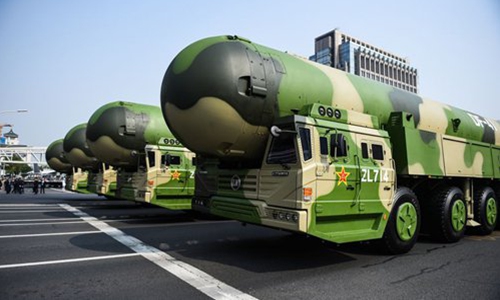


A formation of Dongfeng-41 intercontinental strategic nuclear missiles takes part in a military parade celebrating the 70th anniversary of the founding of the People's Republic of China in Beijing, capital of China, October 1, 2019. Photo: Xinhua
US officials have been making a lot of noises about China joining the US-Russia negotiation on nuclear arms reduction, but China has no interest in joining, given the huge gap between the nuclear arsenal of China and those of the US and Russia, and China has the need to improve its military capabilities, a senior Chinese diplomat said on Wednesday.
People have reason to be concerned about the gap when the US is not only expanding, improving and upgrading its nuclear arsenal, but at the same time also building all the missile defense systems and deploying them in China's neighborhood, Fu Cong, head of the Department of Arms Control of the Chinese Foreign Ministry, told a press briefing in Beijing in which the Global Times participated.
The US is developing weapons in space, has withdrawn from the Intermediate-Range Nuclear Forces (INF) Treaty, and has made it explicitly clear that it is planning to deploy land-based intermediate-range missiles in China's neighborhood and on its doorstep, Fu pointed out, noting that all these pose strategic threats to China's security, and people should not be surprised that China sees the need to improve its military capabilities.
At the same time, the Chinese policy of maintaining the minimum deterrent capability and no-first-use policy will not change, but that does not mean China should not modernize its nuclear weapons to defend its national security, Fu said.
The US has a huge nuclear arsenal, with about 5,800 warheads, about 20 times that of China's number, according to international think tanks such as the Federation of American Scientists and SIPRI.
It is also planning on increasing this huge gap by investing about $494 billion in the next 10 years and $1.2 trillion in the next 30 years to upgrade its nuclear arsenal, both the warheads and their delivery systems.
The US is fully aware of the huge gap between the Chinese and US nuclear arsenals, both in terms of quantity and sophistication, Fu said.
"For them, hyping up the China factor is nothing but a ploy to divert world attention, and to create a pretext under which they can walk away from the New START [Strategic Arms Reduction Treaty], as they have done with so many other arms control treaties. The real purpose is to get rid of all possible restrictions and have a free hand in seeking overwhelming military superiority over any adversary, real or imagined," he said.
If the US says it is ready to come down to the Chinese level in terms of its nuclear arsenal, China will be happy to participate, according to Fu.
China's refusal to join the so-called trilateral negotiation does not mean that it is shying away from international nuclear disarmament efforts, and on the contrary, China is a strong advocate of nuclear disarmament in the UN and at the Conference on Disarmament in Geneva. China initiated the dialogue on nuclear doctrines among the UN Security Council's five permanent members (P5), and stands ready to discuss all issues related to strategic stability and nuclear risk reduction in the framework of P5, Fu stressed.
Fu also outlined China's accession to the Arms Trade Treaty. On Monday, the instrument of accession was deposited with the UN Secretary General by the Permanent Representative of China to the United Nations.
Fu said China's accession to this important arms control treaty is another testimony to China's determination to combat illicit arms trafficking and its commitment to multilateralism and the international arms control regime, and also constitutes another concrete step in implementing the grand vision of building a community of shared future for all mankind.
 Fire brigade in Shanghai holds group wedding
Fire brigade in Shanghai holds group wedding Tourists enjoy ice sculptures in Datan Town, north China
Tourists enjoy ice sculptures in Datan Town, north China Sunset scenery of Dayan Pagoda in Xi'an
Sunset scenery of Dayan Pagoda in Xi'an Tourists have fun at scenic spot in Nanlong Town, NW China
Tourists have fun at scenic spot in Nanlong Town, NW China Harbin attracts tourists by making best use of ice in winter
Harbin attracts tourists by making best use of ice in winter In pics: FIS Alpine Ski Women's World Cup Slalom
In pics: FIS Alpine Ski Women's World Cup Slalom Black-necked cranes rest at reservoir in Lhunzhub County, Lhasa
Black-necked cranes rest at reservoir in Lhunzhub County, Lhasa China's FAST telescope will be available to foreign scientists in April
China's FAST telescope will be available to foreign scientists in April "She power" plays indispensable role in poverty alleviation
"She power" plays indispensable role in poverty alleviation Top 10 world news events of People's Daily in 2020
Top 10 world news events of People's Daily in 2020 Top 10 China news events of People's Daily in 2020
Top 10 China news events of People's Daily in 2020 Top 10 media buzzwords of 2020
Top 10 media buzzwords of 2020 Year-ender:10 major tourism stories of 2020
Year-ender:10 major tourism stories of 2020 No interference in Venezuelan issues
No interference in Venezuelan issues
 Biz prepares for trade spat
Biz prepares for trade spat
 Broadcasting Continent
Broadcasting Continent Australia wins Chinese CEOs as US loses
Australia wins Chinese CEOs as US loses